Daily Vocabulary Words: List of Daily Used Words in Leading Indian Newspapers
Hi there. Welcome to this special section @ Wordpandit. Our endeavour here is straightforward: highlighting daily vocabulary words that you would come across in leading newspapers in the country. We have included the following newspapers in our selection:
• The Times of India
• The Economic Times
• Hindustan Times
• Mint
• Indian Express
We are putting in extensive work to develop your vocabulary. All you have to do is be regular with this section and check out this post daily. This is your repository of commonly used words; essentially, we are posting a list of daily used words. Hence, this has significant practical application as it teaches you words that are commonly used in leading publications mentioned above.
Visit the website daily to learn words from leading Indian newspapers.
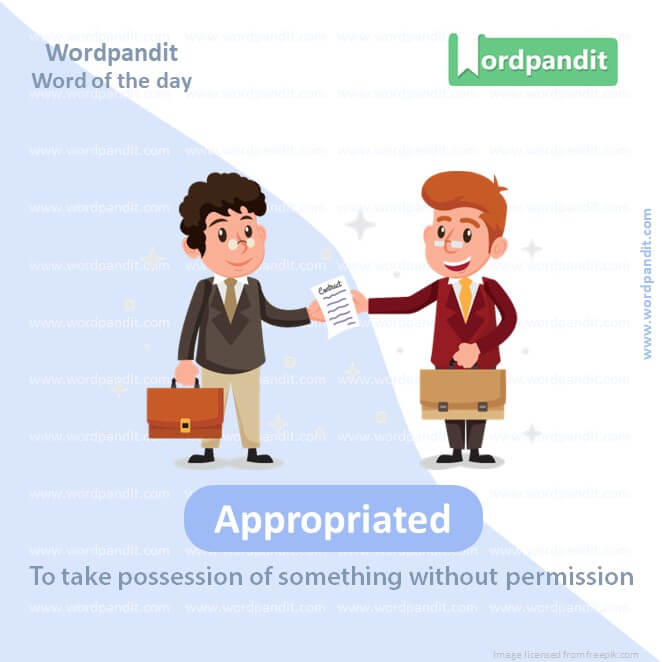
WORD-1: Appropriated
CONTEXT: Local artists claim that their traditional motifs have been appropriated by international fashion brands without giving due credit.
SOURCE: The Times of India.
EXPLANATORY PARAGRAPH: Imagine you have a toy that you love playing with. Now, one day, your friend takes that toy and starts playing with it, saying it’s theirs, even though you never gave it to them. When someone takes something that doesn’t belong to them and says it’s theirs, it’s like they have “appropriated” it.
MEANING: To take possession of something without permission (verb).
PRONUNCIATION: uh-PROpreeayted
SYNONYMS: Seized, Usurped, Commandeered, Taken over, Assumed, Annexed, Expropriated.
USAGE EXAMPLES:
1. The artist felt her work was appropriated by a famous musician.
2. The government appropriated the farmer’s lands for the new highway.
3. She was upset when her design was appropriated by a large clothing brand.
4. Many cultures feel their traditions have been appropriated by outsiders.
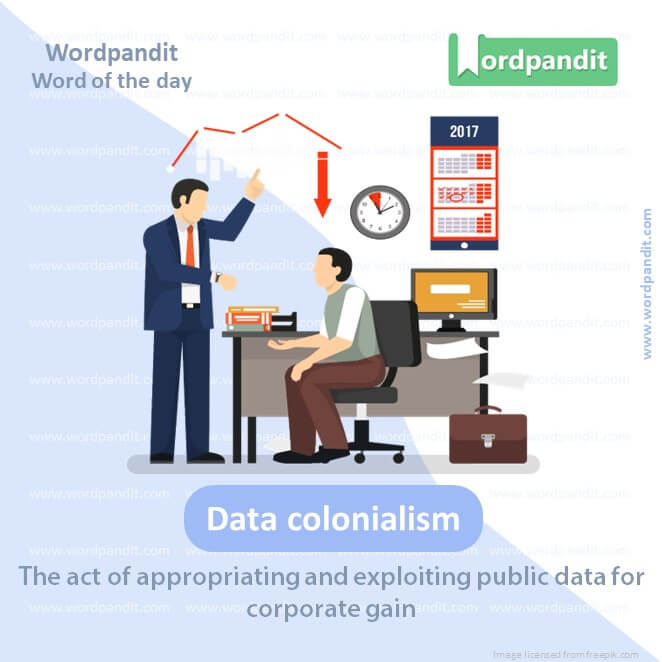
WORD-2: Data colonialism
CONTEXT: In the era of digital expansion, critics argue that data colonialism is the new face of exploitation, with big tech firms amassing vast amounts of data from users without just compensation.
SOURCE: The Economic Times.
EXPLANATORY PARAGRAPH: Let’s say you have a secret diary where you write all your thoughts. Now, someone comes and reads your diary without asking you and then tells others about what’s in it. That’s not nice, right? “Data colonialism” is similar, but in the online world. It’s when big companies take our online information without asking and use it for their benefit.
MEANING: The act of appropriating and exploiting public data for corporate gain (noun).
PRONUNCIATION: DAYtuh kuhLOHneeuhlizm
SYNONYMS: Digital exploitation, Data imperialism, Cyber colonialism, Informational imperialism, Online dominance.
USAGE EXAMPLES:
1. Privacy advocates are raising concerns about data colonialism by tech giants.
2. The new documentary explores the dangers of data colonialism in the digital age.
3. Many believe that data colonialism is the new face of exploitation.
4. The unchecked growth of some apps has raised data colonialism concerns among users.
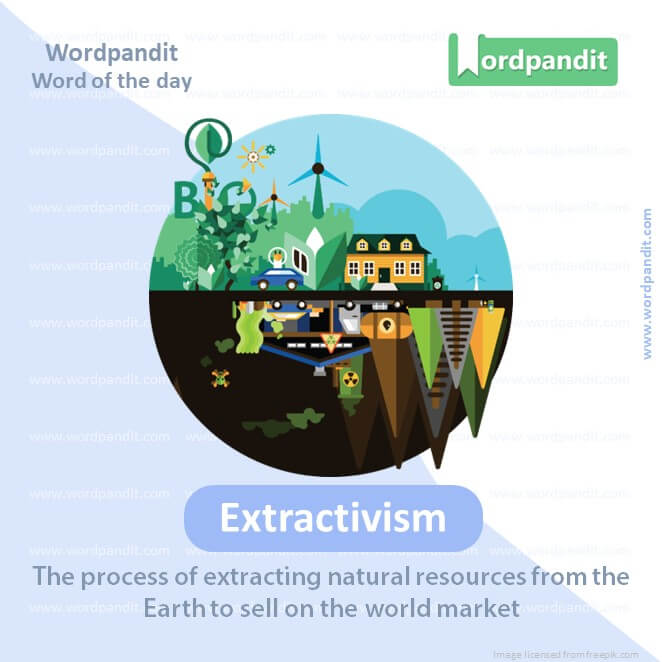
WORD-3: Extractivism
CONTEXT: Environmentalists warn that the continued extractivism of mineral resources without sustainable practices could lead to irreversible ecological damage.
SOURCE: Hindustan Times.
EXPLANATORY PARAGRAPH: Imagine you have a big box of crayons. If you take out crayons every day and don’t replace them, soon you’ll have none left. “Extractivism” is like that but with nature. It’s when people take resources from the Earth, like minerals or trees, without thinking about replacing them or the harm they might be causing.
MEANING: The process of extracting natural resources from the Earth to sell on the world market (noun).
PRONUNCIATION: eksTRAKtivizm
SYNONYMS: Resource depletion, Overharvesting, Exploitation, Resource extraction, Overmining.
USAGE EXAMPLES:
1. The rainforest suffers due to aggressive extractivism.
2. Many indigenous communities oppose extractivism on their lands.
3. Extractivism in mining areas has led to ecological imbalances.
4. The documentary highlighted the negative impact of extractivism on local communities.
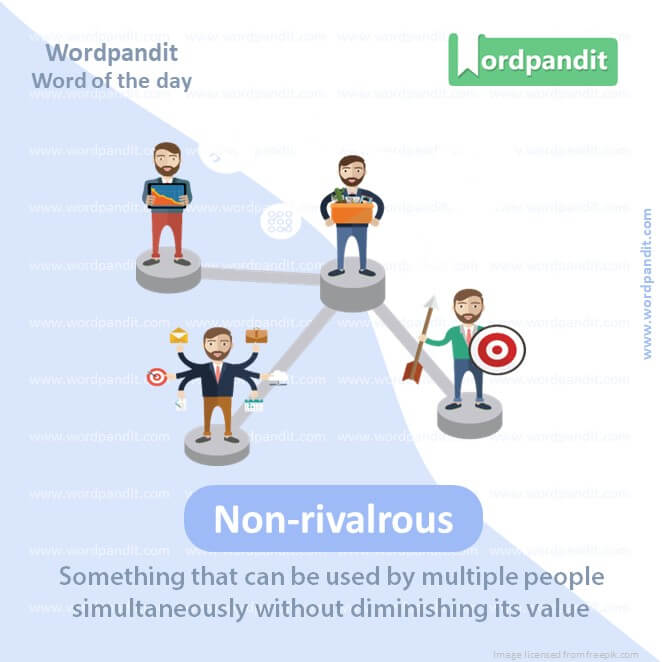
WORD-4: Non-rivalrous
CONTEXT: Digital products, unlike physical goods, are often nonrivalrous, meaning multiple people can use them without diminishing the product’s value or usability.
SOURCE: Mint.
EXPLANATORY PARAGRAPH: Think about your favorite song. You can listen to it, and so can your friend, and both of you enjoy it without taking away from each other. “Nonrivalrous” is when something can be used by many people, and one person using it doesn’t stop others from enjoying it too.
MEANING: Something that can be used by multiple people simultaneously without diminishing its value (adjective).
PRONUNCIATION: nonRYEvuhlrus
SYNONYMS: Shared, Nonexclusive, Jointly usable, Collective, Universally accessible.
USAGE EXAMPLES:
1. Knowledge is considered a nonrivalrous resource.
2. Digital eBooks are nonrivalrous because many can read the same copy simultaneously.
3. Public parks are nonrivalrous spaces where everyone can enjoy.
4. Online courses are often nonrivalrous, allowing many students to learn at once.
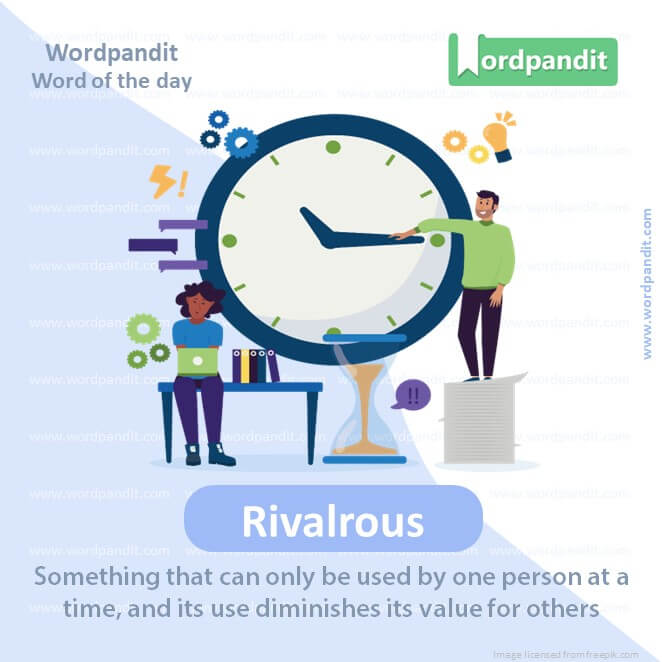
WORD-5: Rivalrous
CONTEXT: Land and real estate are classic examples of rivalrous goods; the usage by one individual precludes simultaneous consumption by another.
SOURCE: The Economic Times.
EXPLANATORY PARAGRAPH: Imagine having only one cookie and both you and your friend want it. If you eat it, your friend can’t have any of it. “Rivalrous” means something is limited and if one person uses it, others can’t use it at the same time.
MEANING: Something that can only be used by one person at a time, and its use diminishes its value for others (adjective).
PRONUNCIATION: RYEvuhlrus
SYNONYMS: Competitive, Exclusive, Restrictive, Limited, Scarce.
USAGE EXAMPLES:
1. A seat on a bus is a rivalrous resource.
2. Food items are typically rivalrous in nature.
3. Parking spaces in the city center are highly rivalrous.
4. Physical books are rivalrous because only one person can read a particular copy at a time.
WORD-6: Fratricide
CONTEXT: The military is investigating a tragic fratricide incident where a miscommunication led to troops mistakenly targeting their comrades.
SOURCE: Indian Express.
EXPLANATORY PARAGRAPH: Imagine two brothers. If one brother hurts the other really badly, it’s a very sad thing. “Fratricide” is a big word that means one brother hurting or even killing another brother. It’s used to talk about such sad and serious actions.
MEANING: The act of killing one’s own brother or sister (noun).
PRONUNCIATION: FRATriside
SYNONYMS: Sibling murder, Brother killing, Kin slaying, Sororicide (for sisters).
USAGE EXAMPLES:
1. The ancient play tells a tragic tale of fratricide.
2. The king’s paranoia led to an act of fratricide in the royal family.
3. Fratricide is one of the darkest themes explored in literature.
4. The community was shocked by the news of the alleged fratricide.
WORD-7: Profound
CONTEXT: The shift in consumer behavior towards online shopping has had a profound impact on the traditional brick-and-mortar retail industry.
SOURCE: Hindustan Times.
EXPLANATORY PARAGRAPH: You know when you learn something so important or feel something so deep, it’s like finding a hidden treasure? That’s what “profound” means. It’s a word for things that are really, really deep or important.
MEANING: Having deep insight or understanding; very great or intense (adjective).
PRONUNCIATION: prohFOUND
SYNONYMS: Deep, Meaningful, Significant, Heartfelt, Intense.
USAGE EXAMPLES:
1. The movie had a profound impact on me.
2. The scientist made a profound discovery about nature.
3. Her words had a profound wisdom that resonated with many.
4. The loss had a profound effect on the entire community.
WORD-8: Ostensible
CONTEXT: Despite the ostensible reasons provided by the government for the policy change, critics argue there are hidden motivations at play.
SOURCE: The Times of India.
EXPLANATORY PARAGRAPH: Imagine you see a box of crayons, but when you open it, you find pencils inside. The box showed crayons, but that wasn’t the real thing. “Ostensible” is a word we use when something seems to be one way, but it might be hiding the real story.
MEANING: Appearing or claimed to be one thing, but possibly something else (adjective).
PRONUNCIATION: osTENsibul
SYNONYMS: Apparent, Seeming, Outward, Supposed, Pretended.
USAGE EXAMPLES:
1. His ostensible reason for visiting was to see old friends, but he had other motives.
2. The ostensible goal of the policy is to help the environment.
3. She made an ostensible effort to complete the task.
4. The ostensible plot of the book hides a deeper message.
WORD-9: Trailblazer
CONTEXT: Dr. Mehta, a trailblazer in the field of renewable energy research, was awarded the prestigious national science award.
SOURCE: Mint.
EXPLANATORY PARAGRAPH: Imagine someone walking in a dense forest where no one has walked before, and they make a path for others to follow. This person is like a “trailblazer”. It means someone who does something first or leads the way for others.
MEANING: A person who makes a new track through wild country or is a pioneer in a particular activity (noun).
PRONUNCIATION: TRAILblayzer
SYNONYMS: Pioneer, Innovator, Pathfinder, Trendsetter, Forerunner.
USAGE EXAMPLES:
1. Marie Curie was a trailblazer in the field of science.
2. The young entrepreneur is seen as a trailblazer in sustainable business.
3. She was a trailblazer in promoting women’s rights.
4. The company is known as a trailblazer in green technologies.
WORD-10: Propel
CONTEXT: The success of their recent product launch is expected to propel the company to new heights in the global market.
SOURCE: Indian Express.
EXPLANATORY PARAGRAPH: Think about blowing up a balloon and letting it go. The air rushes out and makes the balloon zoom around. That air pushes or “propels” the balloon. “Propel” means to push or drive something forward.
MEANING: To drive or push something forward (verb).
PRONUNCIATION: prohPELL
SYNONYMS: Push, Drive, Thrust, Spur, Force.
USAGE EXAMPLES:
1. The strong winds propelled the boat across the water.
2. His ambition propelled him to the top of his profession.
3. The positive reviews propelled the book onto the bestseller list.
4. The rockets propelled the spaceship into outer space.
Vocabulary Daily
Language learning is a beautiful yet complex dance, where ‘vocabulary daily’ connote the integral beats. These everyday words form the essence of most of our conversations and are the cornerstone of effective communication. However, a methodical approach is required to efficiently learn ‘vocabulary daily’.
One key approach to learning ‘vocabulary daily’ is consistency. Engaging with a few words every day consistently fosters better understanding and recall than sporadic cramming sessions.
Interactive tools can add a touch of excitement and ease to mastering ‘vocabulary daily’. Flashcards, word of the day calendars, language learning apps can make the learning experience fun and fruitful. These tools not only introduce new words but often provide a context of use, aiding your understanding.
Making ‘vocabulary daily’ a part of your daily life is a surefire success strategy. Incorporating these words into day-to-day conversations, writing, or social media interactions greatly enhances retention and usage. It also allows you to witness firsthand the impact of a rich vocabulary on the clarity of expression.
To effectively grasp ‘vocabulary daily’, always keep a learner’s curiosity. Explore books, news articles, music, and podcasts in the respective language. This exposure helps in absorbing the words in a real-world context, thus building a robust bond with ‘vocabulary daily’.
In conclusion, understanding ‘vocabulary daily’ is an ongoing process that necessitates consistency, interactive learning, practical application, and a learner’s curiosity. By following this comprehensive approach, the task of mastering ‘vocabulary daily’ becomes less of a chore and more of an enriching journey that can lead to eloquent and effective communication. So, step into the exciting world of ‘vocabulary daily’ and let it colour your language learning adventure with shades of clarity, confidence, and joy.













